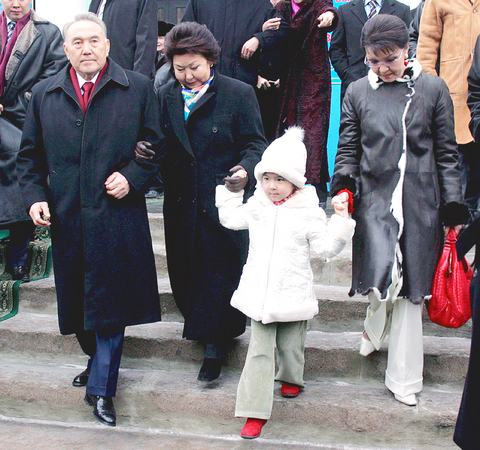Kazakhstan voted yesterday in a presidential election expected to see Nursultan Nazarbayev, whose 16-year rule has turned this Central Asian giant into a major oil power, win another seven-year term.
Despite allegations of fraud, corruption and authoritarian tendencies, polling indicated that Nazarbayev, 65, should easily defeat his four opponents.
The president enjoys widespread support thanks to growing prosperity in this former Soviet backwater that has enjoyed billions of dollars of foreign investment in its Caspian Sea oil fields and is set to become a top 10 world oil producer within a decade.

PHOTO: EPA
"Of course I'll vote for the current president," said pensioner Margarita Alexandrova, 65, one of the first voters in the capital Astana, where polling stations opened in sub-zero temperatures and pre-dawn darkness.
"Nazarbayev inspires confidence. The opposition does not."
Kazakhstan, roughly the size of western Europe or India and once part of Genghis Khan's empire, has never held an election judged free and fair by Western observers.
The opposition complains that media bias and pressure from the authorities skewed the election campaign, and on Sunday leading opposition candidate Zharmakhan Tuyakbai reported attempts to tamper with the electronic voting system in provincial areas.
However, Nazarbayev, voting at a polling station set up in an Astana theater, said: "These elections will be more democratic than ever before."
He also predicted that Kazakhstan "will be one of the 50 most developed countries in the world."
After three hours of voting, turnout reached about 10 percent of the 8.6 million eligible voters, election authorities said.
Nazarbayev's main challengers were Tuyakbai, who is a former prosecutor general and ex-parliament speaker, and former labour minister Alikhan Baimenov.
Also running were Mels Yeleusizov of the environmentalist Tabigat movement and Yerasyl Abilkasymov of the People's Communist Party.
Tuyakbai, who has previously warned that Nazarbayev is dragging Kazakhstan toward dictatorship, was upbeat as he voted in his hometown of Almaty, the country's largest city. "This is a day of hope and freedom," Tuyakbai, 58, said.

Kehinde Sanni spends his days smoothing out dents and repainting scratched bumpers in a modest autobody shop in Lagos. He has never left Nigeria, yet he speaks glowingly of Burkina Faso military leader Ibrahim Traore. “Nigeria needs someone like Ibrahim Traore of Burkina Faso. He is doing well for his country,” Sanni said. His admiration is shaped by a steady stream of viral videos, memes and social media posts — many misleading or outright false — portraying Traore as a fearless reformer who defied Western powers and reclaimed his country’s dignity. The Burkinabe strongman swept into power following a coup in September 2022

‘FRAGMENTING’: British politics have for a long time been dominated by the Labor Party and the Tories, but polls suggest that Reform now poses a significant challenge Hard-right upstarts Reform UK snatched a parliamentary seat from British Prime Minister Keir Starmer’s Labor Party yesterday in local elections that dealt a blow to the UK’s two establishment parties. Reform, led by anti-immigrant firebrand Nigel Farage, won the by-election in Runcorn and Helsby in northwest England by just six votes, as it picked up gains in other localities, including one mayoralty. The group’s strong showing continues momentum it built up at last year’s general election and appears to confirm a trend that the UK is entering an era of multi-party politics. “For the movement, for the party it’s a very, very big

ENTERTAINMENT: Rio officials have a history of organizing massive concerts on Copacabana Beach, with Madonna’s show drawing about 1.6 million fans last year Lady Gaga on Saturday night gave a free concert in front of 2 million fans who poured onto Copacabana Beach in Rio de Janeiro for the biggest show of her career. “Tonight, we’re making history... Thank you for making history with me,” Lady Gaga told a screaming crowd. The Mother Monster, as she is known, started the show at about 10:10pm local time with her 2011 song Bloody Mary. Cries of joy rose from the tightly packed fans who sang and danced shoulder-to-shoulder on the vast stretch of sand. Concert organizers said 2.1 million people attended the show. Lady Gaga

SUPPORT: The Australian prime minister promised to back Kyiv against Russia’s invasion, saying: ‘That’s my government’s position. It was yesterday. It still is’ Left-leaning Australian Prime Minister Anthony Albanese yesterday basked in his landslide election win, promising a “disciplined, orderly” government to confront cost-of-living pain and tariff turmoil. People clapped as the 62-year-old and his fiancee, Jodie Haydon, who visited his old inner Sydney haunt, Cafe Italia, surrounded by a crowd of jostling photographers and journalists. Albanese’s Labor Party is on course to win at least 83 seats in the 150-member parliament, partial results showed. Opposition leader Peter Dutton’s conservative Liberal-National coalition had just 38 seats, and other parties 12. Another 17 seats were still in doubt. “We will be a disciplined, orderly